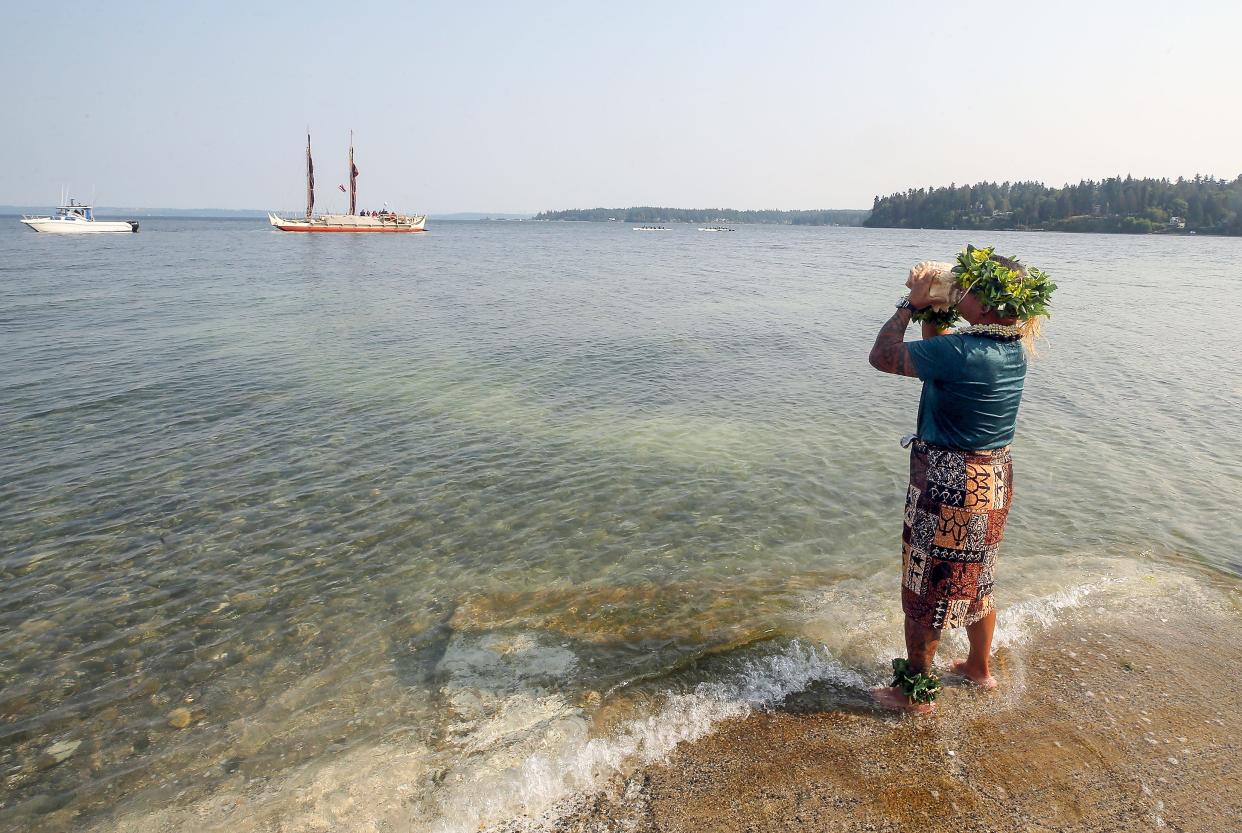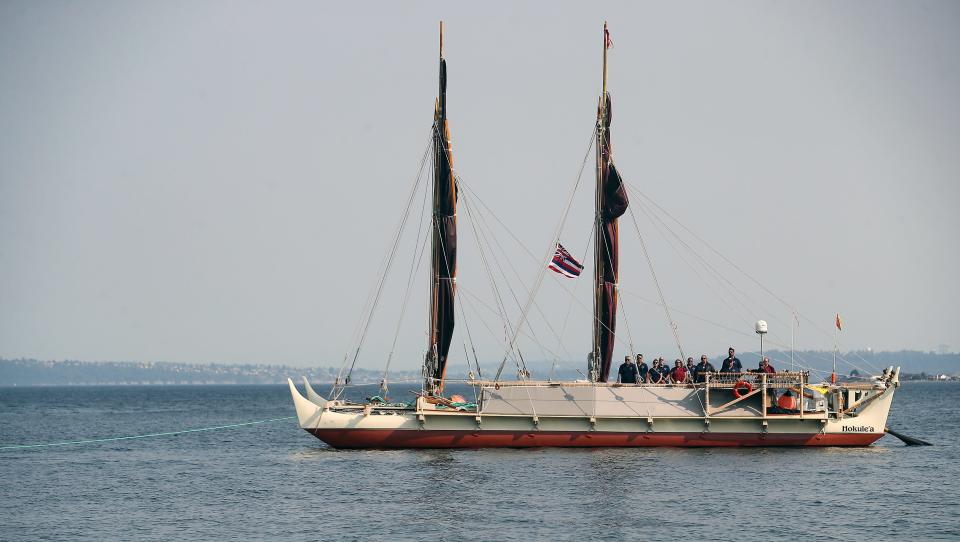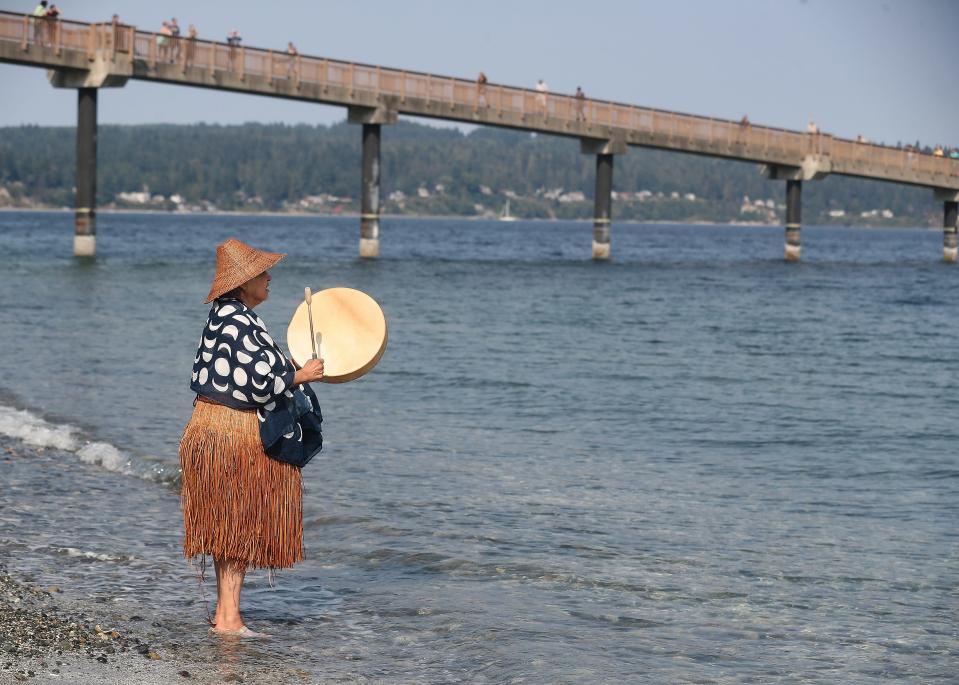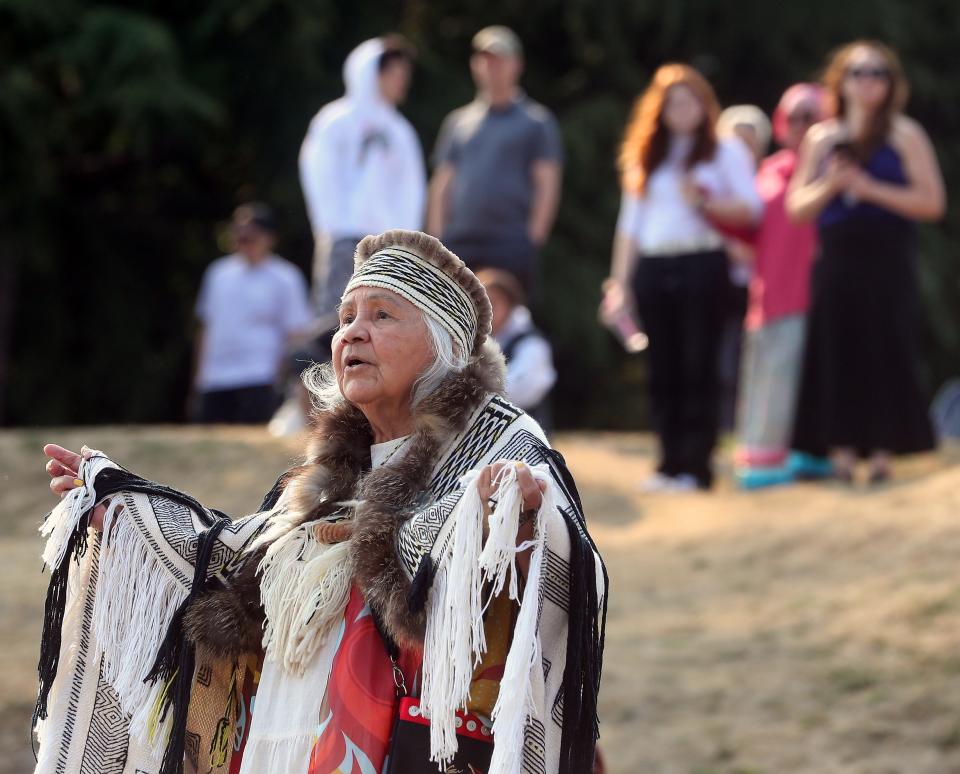Polynesian canoe from Hawaii docks in Suquamish during 4 years of global voyage

SUQUAMISH — Indigenous cultures connected Thursday afternoon outside the House of Awakened Culture when Hōkūleʻa, a Polynesian canoe from Hawaii, arrived at the shoreline in Suquamish.
After being granted permission by Suquamish Chairman Leonard Forsman, the canoe docked at around 4:30 p.m. after a journey from Victoria, B.C. The eleven crew members walked onto the shore to enjoy dinner, songs and dance prepared by the Suquamish Tribe.
The Hōkūleʻa crew will stay in Suquamish until the canoe leaves for Seattle on Saturday morning.
The sailing from Victoria to Washington is just the beginning of the Hawaii canoe's four years of circumnavigating the Pacific Ocean, from June 2023 to Spring 2027, known as the Moananuiākea Voyage. The canoe will sail about 43,000 nautical miles and visit 36 countries and archipelagoes, nearly 100 Indigenous territories and more than 300 ports, according to the Polynesian Voyaging Society (PVS), the organization that leads the voyage.
"We're all excited about being here and meeting everybody," Hōkūleʻa Captain Bruce Blankenfeld said after the crew docked in Suquamish. "It's nice to be here and be able to share with the people here, with the Suquamish people."
The last time Hōkūleʻa docked at the shore of Suquamish was in 1995 during a West Coast voyage that ended in San Francisco, Blankenfeld said. The voyage throughout the Pacific is the canoe's 15th major voyage since it was first launched in 1975.

Voyage in Pacific: Exploring, sharing and learning
The Moananuiākea voyage is a global educational campaign launched by the Polynesian Voyaging Society, an organization founded in 1973 that is dedicated to perpetuating the art and science of traditional Polynesian voyaging and the spirit of exploration through educational programs. The organization wanted to inspire students and communities to respect and care for one another and their natural and cultural environments.
Built in Honolulu 49 years ago, Hōkūleʻa is a replica of an ancient Polynesian double-hulled voyaging canoe. At 62-feet long and 20-feet wide, the canoe was designed by artist and historian Herb Kawainui Kāne, one of the founders of the PVS.
Voyaging canoes were built for exploration, for traveling far to seek answers and new ideas that would be beneficial to others back home, said Blankenfeld, who's from Niu Valley, Hawaii.
"It's part of our living culture, working culture, so we just do it," Blankenfeld said.
The voyage amplifies the importance of oceans and Indigenous knowledge through port engagement and storytelling, according to PVC.
Crew members switch out every five weeks or so throughout the four-year voyage. Hōkūleʻa started the Moananuiākea voyage in Juneau, Alaska, on June 15 and went through British Columbia before it arrived in Washington state from the Salish Sea on Thursday.
The crew arriving in Suquamish was onboard in Vancouver on Aug. 7 and stopped over on Salt Spring Island and Victoria before the departure to Puget Sound. They'll sail the canoe to Seattle on Saturday and a new crew will take over the boat once it arrives in Tacoma on Aug. 30 to continue its journey on the West Coast.
Jonah Apo, 23, from Nuʻuanu, Oʻahu, was one of the crew members navigating the canoe from Vancouver to Suquamish in the past three weeks. It was Apo's first time sailing with Hōkūleʻa on a global voyage. He's excited to be part of the journey, Apo said.
"I'm so honored to be here and experience all these beautiful places, being hosted by the Indigenous people here," Apo said. "I look forward to all the learning and sharing of culture that will happen."

Apo said the crew is able to collect stories from the different First Nations they meet and share their stories with others. While continuing their tradition of exploring Polynesia, the voyage also connects communities and Indigenous people and raises awareness of issues that affect the oceans.
The crew heard of the wildfires on Maui Island when they were in Vancouver, Apo said. As Maui is where many current or former crew members of Hōkūleʻa live, it was very heavy news to those sailing far from home, but they saw the communities in Hawaii were coming together to help.
"I know when we return home after this leg, I'll be there to help, too," Apo said.
'Canoe is cool' for Kitsap residents welcoming guests
The arrival of the ancient canoe attracted people from around the county to gather at the Suquamish beach on Thursday afternoon. Marie Scates came to Suquamish with her husband and her two sons, Dillon, 9, and Conner, 13, to see the arrival of Hōkūleʻa. She heard the news from her friend Kiana Sallee who is a family member of two Hōkūleʻa crew members, her father, Garyand Yuen, and brother Kaiola Yuen.
Marie said it is the first tribal event the family has joined since they moved to Kitsap County.

"I think it's pretty cool," Marie said. "We brought our kids because we think it's a cool educational experience for them to watch and be a part of."
Her son Dillon skipped his soccer practice in the afternoon to see Hōkūleʻa coming in. This was the first time he saw a canoe sailing through the water.
"Canoe is cool," said Dillon. Now, the 9-year-old boy wants to go to Hawaii, Marie added.
The canoe will leave the Suquamish shore and enter Elliot Bay at around 8 a.m. on Saturday. The public will have a chance to tour the canoe from 1 p.m. to 4 p.m. on Saturday at Pier 62 and from 1 p.m. to 3 p.m. at the nearby Bell Harbor Marina on Sunday and Monday.
"There is a lot of Pacific Islanders and Hawaiians in this area, so it would be nice to be able to bring the canoe into Seattle and be able to share and chat and talk story with everyone," Blankenfeld said.
"We hope to see you guys," the captain said.
The canoe is planning to sail through the West Coast of the U.S. through November and head to Mexico, Central America and South America from November to February next year. Other areas included in the 47-month sail plan are Galapagos, Rapa Nui, Pitcairn Islands, Marquesas Islands, Tuamotus, Tahiti, Austral Islands, Cook Islands, Kiribati, Samoa, Fiji, Tonga, New Zealand, Melanesia and Micronesia, Palau, Philippines, China, Taiwan, Okinawa, Japan, South Korea, Hokkaido and Russia.
This article originally appeared on Kitsap Sun: Hōkūleʻa canoe from Hawaii arrives in Suquamish, Washington

